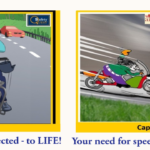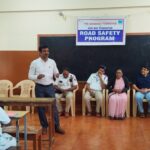3 Aug 2018 : We had this session at the Hoodi facility of Tata Elxsi. ~100 employees attended.
I try to keep updating my material with new inputs, new ideas. This time, I decided to mix narrative stories with data/non-narrative messages. Research says that the story-based interventions most strongly affect people’s intentions to change their behavior, while non-narrative messages most strongly affect cognitive beliefs and attitudes.
I opened with the story of the Poladpur accident – A group of 32 started off on a picnic, with 2 drivers. Unfortunately, at a place near Poladpur, the bus went off a cliff and fell into a deep gorge! There was one person who miraculously escaped, but 33 people crashed to their unfortunate, untimely death.
“33 .. is that a big number? .. well, we lose over 400 every day in our country! That is like a plane crashing down every day!”
I also linked other information on the Poladpur accident at the relevant places.
One report has it that the bus skid and slipped over loose stones and wet mud. In the section on speeding, I referred to this. Safe speed is decided by the context, not just the sign board. And for this, the driver has to be attentive. When driving on surfaces such as gravel, wet roads, loose stones, the traction between the tire and the surface is low. “Drive to the conditions”: slow down to keep the vehicle in control.
Another report has it that the driver turned back for a moment to talk to the passengers. Passengers can be a distraction! And in most cases, they do not realise it! Yet, the driver has to stay focused on the road. Prepare mentally and physically for the journey. His primary job is to get himself, his passengers, the vehicles safely to the destination without any harm to the other vehicles, people or property.
I also decided to change the term “Defensive Driving”. The term “Defensive” has several synonyms that are apt in our context : alert, watchful, cautious, on guard. But “defensive” has a passive connotation. And, there is one other element that is important : anticipation. Therefore, I have now decided to call it Proactive Driving : be alert, and anticipate! Could the bus driver have anticipated the kind of distractions possible on the picnic, and better prepared to deal with them?
One person came up to me and asked about how much we are able to influence politicians. I hope that the collective effort of like-minded organizations will be successful – and we will get to see the Motor Vehicles Amendment Bill passed through the Rajya Sabha !
I sincerely thank Sunil Kumar and RS Murthy for giving me this opportunity.
Here are a few more pics from the session.







